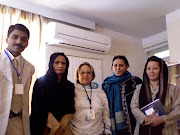'If you want to settle a thing, you see your opponent and talk it over with him. The last thing to do is write him a letter' said Lloyd George as a precursor to Summit level meetings. The word 'Summit' gained political and diplomatic meaning when Winston Churchill termed meetings between great powers 'Summit meetings'. It is no surprise that the recently concluded Afro-Asian summit showcased the solidarity of major powers in Asia and Africa. Dozens of dignitaries - including Chinese President Hu Jintao, Japanese Prime Minister Junichiro Koizumi, Indian Prime Minister Manmohan Singh, Pakistani President Musharaf, South African President Thabo Mbeki and UN Secretary General Kofi Annan - signed the Summit Declaration. Leaders from 100 Asian and African countries also signed a new Strategic Partnership to ensure "peace, stability and security in the two continents." However, this summit will be remembered by Indian policy makers for its twists and turnouts that helped India to gain prominence.
-
Firstly, the participation of Prime Minister Manmohan Singh has special significance since India has "emerged as an economic powerhouse in the past decade." It had welcomed the Chinese premier, Wen Jiabao, Pakistani President Pervez Musharraf and the Japanese Prime Minister, Koizumi. India's stature on the Afro-Asian stage is obvious since Manmohan Singh was chosen the Head of the Afro-Asian Summit.
-
Secondly, India has committed to deepen its economic linkages with Africa. Through its 'Technical And Economic Cooperation Programme', India has proposed to increase the monetary value of its technical assistance, including training, deployment of experts and projects aid, which is now about US dollar one billion. It should be remembered that India has already embarked on an initiative with eight West African countries, known as the 'Team Nine Initiative'.
-
Thirdly, India used this Summit to emphasize the need for a comprehensive reform of the 'Yalta Order of international political institutions'. Calling for an inter-continental resolve to refashion the UN, including the Security Council, Singh said it was necessary to reform both the UN and the Bretton Woods institutions so that they would "reflect the realities of 2005."
-
Fourthly, at the South Asian level, reflecting the success of Indian diplomacy, Pakistan PM raised the issue of relations with India in a completely positive light. Singh also complimented Musharraf for his positive statement at the Summit. "It is perhaps the rare occasion that Pakistan has not indulged in India-bashing at a multilateral forum," he noted.
-
Fifthly, the Summit provided India and Nepal an opportunity to deliberate on the situation in Nepal during their "frank and cordial meeting". It is the first meeting between the two leaders since the Nepalese monarch seized direct control of the Government in Kathmandu in February. India reconfirmed that, "it is not just a question of 're-energising' the political process, but of allowing multi-party democracy to come into full play." Earlier, India had refused to attend the Dhaka SAARC summit in February due to the monarchical coup in Nepal and the security situation in Bangladesh. But in a meeting on the sidelines of the summit, the Indian and Bangladeshi Foreign Ministers agreed to work out a new timetable for the aborted SAARC summit.
It is obvious that the Summit was not an isolated event. Hans Morganthau defined modern summitry "as the classic conception of drama, wherein the will of the actors was confined in the shackles of determinism. The outcome at the final curtain was predetermined by the opening up of the drama in the first act, accounting for all the conditions and causes of later developments." The outcome of this Summit was also predetermined which becomes evident by analyzing the changes that have taken place in Asian politics in general and South Asian politics in particular.
To conclude, multilateral summits are increasingly becoming a place where politicians will be convinced that their public image depends on the extent to which they address the interests of their domestic constituencies. This Afro-Asian summit will be remembered as a defining moment not only for India, but for the world, if both Asia and Africa achieve their goal of "a positive and enlightened ethic of globalization, built on democratic foundations and a genuine commitment to the cause of pluralism."












No comments:
Post a Comment